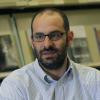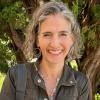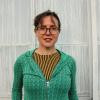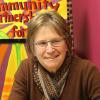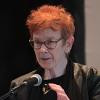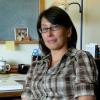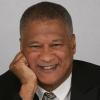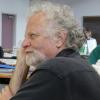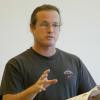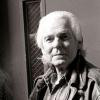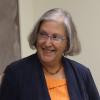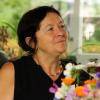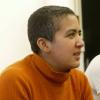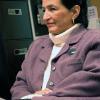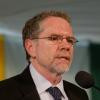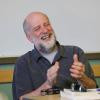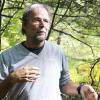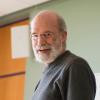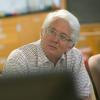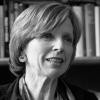Faune Albert 02F
Co-director of the Writing Program and Faculty Associate
Learn More
Nathalie Arnold
Professor of Anthropology, Literary Arts and African Studies
Learn More
Felicity Aulino
Five College Assistant Professor of Anthropology
Learn More
Jennifer Bajorek
Professor of Comparative Literature and Visual Studies
Learn More
Jeffrey Barton
Professor of Mathematics
Learn More
Kaća Bradonjić
Associate Professor of Physics and Director of Assessment
Learn More
Melissa Burch
Associate Professor of Cognitive Development
Learn More
John Castorino
Associate Professor of Molecular Biology
Learn More
Richard Chu
Five College Associate Professor of History
Christina Cianfrani
Dean of Science and Math and Professor of Hydrology
Learn More
Zoila Coc-Chang
Visiting Assistant Professor of Studio Arts
Learn More
Donna Cohn
Associate Professor of Applied Design
Learn More
Rachel Conrad
Dean of Decolonial, Global and Social Inquiry and Professor of Childhood Studies
Learn More
Alejandro Cuellar 00S
Co-Director of the Writing Program and Senior Faculty Associate
Learn More
Omar S. Dahi
Professor of Economics
Learn More
Jonathan Dent
Assistant Professor of Theatre
Learn More
Jess Erion
Visiting Assistant Professor of Game Design
Learn More
Jina Fast
SHIFT Assistant Professor of Applied Ethics and the Common Good
Learn More
Cynthia Gill
Associate Professor of Physiology
Learn More
Kat Glick
Visiting Assistant Professor of Psychology
Learn More
rl Goldberg
Assistant Professor of Queer Studies
Learn More
Viveca Greene
Associate Professor of Media Studies
Learn More
Jennifer Gutterman
Assistant Professor of Game Design and Game Studies
Learn More
Salman Hameed
Charles Taylor Chair and Professor of Integrated Science and Humanities
Learn More
Michele Hardesty
Associate Professor of U.S. Literatures and Cultural Studies
Learn More
Caoimhe Harlock
Assistant Professor of Creative Writing and US Literatures
Learn More
Gaurav Jashnani
Assistant Professor of Psychology, Africana Studies and Social Transformation
Learn More
Sarah E. Jenkins
Assistant Professor of Animation, Creative Arts, and Visual Culture
Learn More
Juliet Johnston
Assistant Professor of Environmental Microbiology and Bioremediation
Learn More
Amy Jordan
Associate Professor of African American History
Learn More
Peter Kallok
Professor of Theatre Design
Learn More
Lili M. Kim
Professor of History and Global Migrations
Learn More
Gregory S. Kline
Studio Arts Technician and Senior Faculty Associate
Learn More
Karen Koehler
Professor of Architectural and Art History
Learn More
Thom Long
Dean of Art and Media and Professor of Architecture and Design
Learn More
Susana Loza
Professor of Critical Race, Gender, and Media Studies
Learn More
Kristen Luschen
Five College Professor of Education Studies
Learn More
Nathan McClain
Assistant Professor of Creative Writing & African American Literary Arts
Learn More
Rebecca Miller
Professor of Music
Learn More
Allison Monroe
Director of the Five College Early Music Program and Lecturer in Music
Learn More
Rayane Moreira
Associate Professor of Organic Chemistry
Learn More
Molly Morin
Visiting Assistant Professor of Studio Arts
Learn More
Kenneth Mulder
Associate Professor of Data Analysis and Modeling
Learn More
Junko Oba
Associate Professor of Music
Learn More
Olabode Omojola
Five College Professor of Music
Learn More
Abraham Ravett
Professor of Film and Photography
Learn More
Eduardo Rivera
Visiting Assistant Professor of Photography
Learn More
Noah Romero
Assistant Professor of Native American and Indigenous Studies
Learn More
Steven Roof
Professor of Earth and Environmental Science
Learn More
Eva Rueschmann
Professor of Cultural Studies
Learn More
Lise Sanders 90F
Professor of English Literature & Cultural Studies
Learn More
Daniel Kojo Schrade
Professor of Art
Learn More
John Slepian
Five College Professor of Art and Technology
Learn More
Jutta Sperling
Professor of History
Learn More
Kane Stewart
Senior Faculty Associate in Film and Photography
Learn More
Amy Teffer
Visiting Assistant Professor of Animal Science
Learn More
Michelle Trujillo
Assistant Professor of Experimental Film and Media
Learn More
Jennifer VanWyk
Assistant Professor of Ecology and Global Change
Learn More
James Wald
Associate Professor of History
Learn More
Jeffrey Wallen
Professor of Comparative Literature
Learn More
Lailye Weidman
Visiting Assistant Professor of Dance
Learn More
Laura Wenk
Director of Assessment, Professor of Cognition and Education
Learn More
Angela Willey
Five College Assistant Professor of Women, Gender, and Sexuality Studies
Learn More















